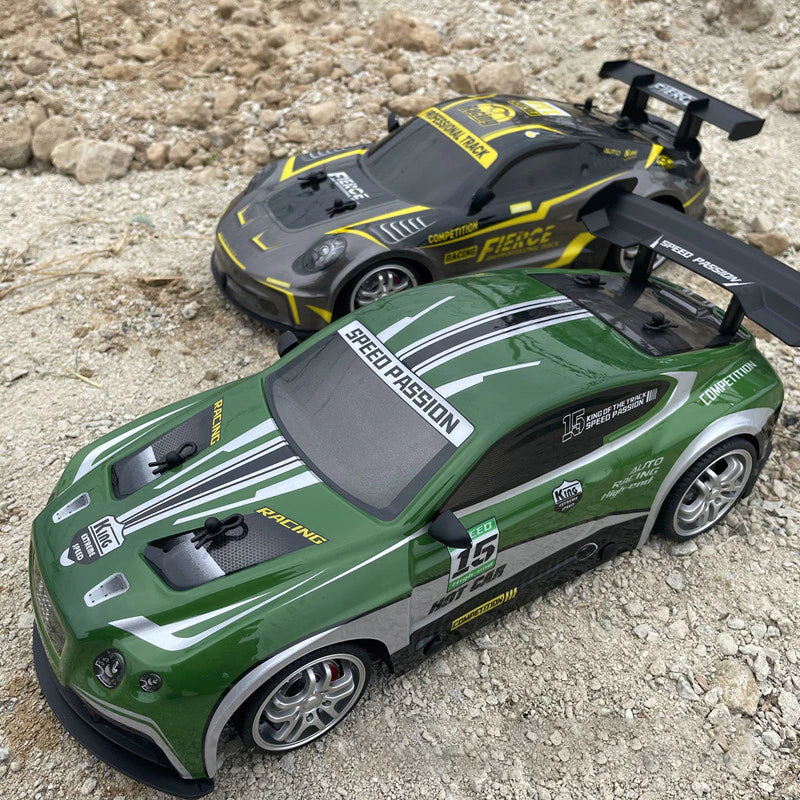
What Do RC Cars Run On?
Share
What do RC Cars Run On?
Remote-Controlled (RC) cars have been delighting hobbyists and enthusiasts of all ages for decades. These pint-sized vehicles can zoom around with impressive speed and agility, providing endless fun and excitement. But have you ever wondered what exactly powers these tiny beasts? In this blog, we'll explore the fascinating world of RC cars and uncover the various power sources that drive these miniature marvels.
- Electric-Powered RC Cars
Electric-powered RC cars are the most common and beginner-friendly option in the world of remote-controlled vehicles. They run on rechargeable batteries, which offer a perfect blend of convenience and performance. There are two primary types of electric RC cars:
a. Brushed Motor RC Cars: Brushed motor RC cars are the traditional choice for beginners. Inside the motor, carbon brushes make contact with a rotating armature, causing it to spin. Though reliable and affordable, brushed motors are less efficient and have shorter lifespans compared to brushless motors.
b. Brushless Motor RC Cars: As technology advanced, brushless motors revolutionized the RC car industry. These motors employ electronic speed controllers (ESCs) to run the vehicle. Unlike brushed motors, brushless motors don't have physical brushes, making them more efficient, durable, and powerful. They deliver higher speeds and longer run times, making them a favorite among experienced RC enthusiasts.
- Nitro-Powered RC Cars
For those seeking the authentic roar and smell of a real engine, nitro-powered RC cars offer an adrenaline-pumping experience. These cars utilize a special fuel mixture consisting of nitromethane, methanol, and oil. Inside the car, a small internal combustion engine powered by this fuel mixture drives the vehicle.
The process of running a nitro-powered RC car involves a pull-start or a starter box to crank the engine. Nitro RC cars are known for their speed and realistic engine sounds. However, they require regular maintenance and tuning to ensure optimal performance.
- Gas-Powered RC Cars
Gas-powered RC cars, also known as petrol-powered RC cars, are somewhat similar to nitro-powered ones, but they use regular gasoline instead of the nitro fuel mixture. These cars come equipped with two-stroke engines that burn the gasoline-oil blend for power. Gas-powered RC cars offer a longer run time compared to nitro cars and are popular among hobbyists who prefer extended play sessions.
- Solar-Powered RC Cars
As the world shifts towards sustainable energy solutions, solar-powered RC cars are becoming increasingly popular. These eco-friendly vehicles are equipped with small solar panels that capture sunlight and convert it into electrical energy to power the car. Though they may not reach the same speeds as electric, nitro, or gas-powered cars, solar RC cars provide a great way to teach youngsters about renewable energy sources and environmental responsibility.
Conclusion
RC cars have come a long way since their inception, evolving into high-performance machines that cater to various preferences and skill levels. Whether you opt for the convenience of electric-powered cars, the thrilling experience of nitro engines, the longer run times of gas-powered vehicles, or the eco-consciousness of solar-powered versions, there's an RC car for everyone.
Each power source offers a unique set of advantages, making the world of RC cars a diverse and exciting domain. So, next time you see an RC car zooming past, you'll have a better understanding of the technology that fuels its adventurous drive. Embrace the excitement, explore the options, and let your passion for RC cars drive you to new horizons!

